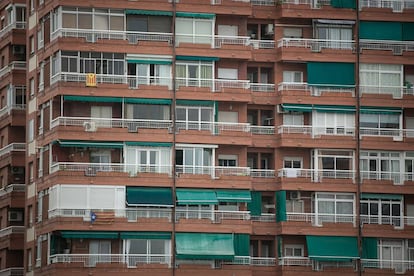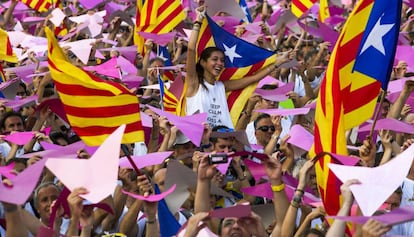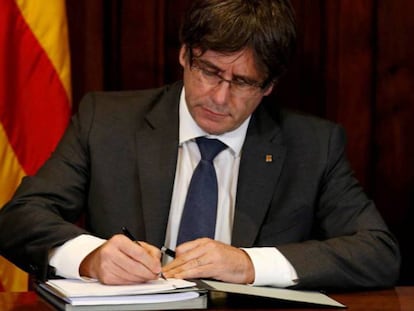The silent majority opposed to independence in Catalonia
Doubters and opponents of referendum are faced with hordes of flag-waving separatists
If surveys show that a majority of Catalans – particularly younger generations – disagree with the independence referendum the regional government is determined to hold on October 1, why do things feel like it’s exactly the other way around?

The silence of the majority, and its lengthy absence from the public arena, have created the illusion that “a majority of Catalans want independence.” This illusion is shared by the secessionist minority and by observers outside Catalonia.
Yet survey after survey contradicts this view.
To them, the other half of the country simply doesn’t count, and all forms of cheating are allowed Publisher Miguel Aguilar
With three weeks to go before the October 1 referendum, EL PAÍS asked a group of experts the following question: why doesn’t the majority speak out? This is the response of architect Fermín Vázquez, publisher Miguel Aguilar, doctor and activist Álex Ramos, writer Milena Busquets, communications consultant David Espinós and a Barcelona judge, who spoke on the basis of anonymity.
“We all want to be tolerant. But you don’t expect to be treated so contemptuously,” says Fermín Vázquez. “Ultimately, it is frightening to face up to so many people who are so emotional about the issue. Flag-waving crowds are always scary.”
Four years ago, the Catalonia-based writer Javier Cercas – a recurring target of secessionist ire – warned about the dangers of “unanimism,” a term coined by the French historian Pierre Vilar, an expert on the history of Catalonia. Unanimism is “the illusion of unanimity created by fear of expressing dissidence.”
Vázquez says that this fear increases when “the authorities themselves are happy to bypass the law in a partisan manner; it is inevitable that those who disagree will be categorized as disaffected.”

Miguel Aguilar, a Barcelona-based publisher originally from Madrid, says there are several reasons why those who question Catalan independence keep quiet.
“We are not as cohesive a group as [the secessionists], nor is the fight against independence the sole driver of our lives. We’re talking about a silent majority against an outspoken minority that is very well organized and very well subsidized. We don’t have a single answer to solve the problem, but they do: independence.”
Aguilar adds further nuance to the debate: “This is not a war between Madrid and Barcelona or between Catalans and Spaniards; it’s between Catalans themselves. Half of Catalonia is bending the other half to its will; this is also a revolt of the rich against the poor, as Javier Cercas has noted.”
Álex Ramos, a medic who is also a member of the Socialist Party as well as a grass-roots activist with Sociedad Civil Catalana, which opposes independence and supports better relations with Madrid, warns that this silence has been crafted through years of slow “hammer-and-chisel” action.
“What we are seeing right now is a coup d’état, but this is a situation that has been developing for a long time,” he says. “They’ve been sowing the seeds for years and years and years. First there was a spiral of silence because of the secessionists’ hegemony in politics, inside schools, on TV and in the newspapers. We kept quiet because society is divided over this and people are suffering. Families argue, the way they did in the Basque Country. It’s true that you could get shot over there, but over here there is such a thing as civil death. You could lose your job over your views. I take that risk because I feel I have to, but a lot of people are afraid to come out with their non-secessionist opinions.”
“It’s very tough, because they have shown their real face: the face of an identity-based, supremacist nationalism,” continues Ramos. “They want to be independent because they believe themselves to be better than the rest.”

Vázquez, the architect, expands on that notion. “It is often said that [Spanish PM Mariano] Rajoy is a one-man factory churning out new secessionists, but you could turn that on its head and say that the secessionists are constantly creating new Rajoys. It’s hard to say what’s worse about the secessionists’ arguments – whether their superiority complex when they assert that Spain is “beyond repair,” or the fact that they reject any notion of joint responsibility over the state of affairs.”
“Nobody thought that a minority could use half-truths or falsehoods, twist universally shared concepts such as freedom and democracy in such a crass manner, and get so far. But it happened with Trump and his ‘Make America Great Again,’ and it happened with Brexiteers and their ‘Europe is robbing us’,” he adds.
David Espinós, a communications consultant, offers another explanation for why so many Catalans remain silent.
“I think the media and politicians are driving this, but the public is not that concerned,” he says. “The microcosms of politics and journalism feed into one another and try to pass that along to the public, but there are a lot of people who still don’t feel personally involved. It’s not worth taking any action when you’re in danger of being categorized and stigmatized. Political parties are very aware of public opinion. Nobody has ever asked me until now which way I was going to vote, but with the referendum you’re being forced to take a stand and make it public. And I disagree with that.”
They want to be independent because they believe themselves to be better than the rest Álex Ramos, doctor
Milena Busquets feels that the war of words between political parties and between the governments in Barcelona and Madrid is spreading confusion and could ultimately have a boomerang effect.
“A lot of people may not necessarily support independence or the referendum, but could still vote at the last minute as a sign of rebellion against the outrageous things being said by some journalists, or as a reaction to Madrid’s ban.”
Miguel Aguilar believes Catalan premier Carles Puigdemont, is hoping for a bad reaction by the Spanish government: “Puigdemont wants to go out in handcuffs, and it’s very hard not to handcuff someone whose political goal is precisely that.”
English version by Susana Urra.
“Emotions are being taken to a level that’s starting to be very dangerous”
A judge in Catalonia has a recurring nightmare. The action takes place on October 1 “anywhere in Catalonia.”
“Organizers of the referendum manage to roll out the ballot boxes, state prosecutors file a complaint, and the local judge asks the Mossos [the Catalan police force] to act,” says the judge, who spoke on the basis of anonymity. “They refuse to do so, and the Spanish Civil Guard is called in. What might happen then in a place like Olot or Vic, where nationalist sentiment prevails? I don’t even want to think about it. Emotions are being taken to a level that’s starting to be very dangerous.”
This magistrate was not born in Catalonia, but moved to Barcelona nearly two decades ago because it seemed like an ideal place to live and work. Now, she does not rule out moving away. "Wednesday [when the regional parliament passed a law enabling the referendum to take place] was a very tough day. I had a similar feeling as I did on 23-F [23 February 1981, day of a failed coup against Spanish democracy in Congress]."
“If this premier and this regional government exist at all, it is thanks to the Spanish Constitution. And if you disobey those who put you there, you lose legitimacy,” she adds. “They pretend to represent all Catalans, they interpret things to suit themselves and ignore everyone else.”
Aguilar and Ramos agree that the Catalan government is seemingly unconcerned about having half of Catalonia against it.
“To them, the other half of the country simply doesn’t count, and since they’re on an epic mission, all forms of cheating are allowed,” concludes Aguilar.
Tu suscripción se está usando en otro dispositivo
¿Quieres añadir otro usuario a tu suscripción?
Si continúas leyendo en este dispositivo, no se podrá leer en el otro.
FlechaTu suscripción se está usando en otro dispositivo y solo puedes acceder a EL PAÍS desde un dispositivo a la vez.
Si quieres compartir tu cuenta, cambia tu suscripción a la modalidad Premium, así podrás añadir otro usuario. Cada uno accederá con su propia cuenta de email, lo que os permitirá personalizar vuestra experiencia en EL PAÍS.
En el caso de no saber quién está usando tu cuenta, te recomendamos cambiar tu contraseña aquí.
Si decides continuar compartiendo tu cuenta, este mensaje se mostrará en tu dispositivo y en el de la otra persona que está usando tu cuenta de forma indefinida, afectando a tu experiencia de lectura. Puedes consultar aquí los términos y condiciones de la suscripción digital.










































